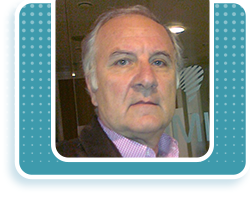
Panagiotis Korovessis, MD, PhD
Chief Orthopedic Spine Surgeon
Patras, Greece
How has the AAOS helped you throughout your career?
AAOS has helped me by deepening my knowledge in General Orthopedics
As an International Member, which AAOS resources do you use most and why?
I get a lot of benefits from the educational resources offered by the AAOS, including online courses, webinars, instructional videos, and conferences. These resources helped me stay updated on the latest advancements and techniques in orthopedic surgery and teach my resident in General Orthopedics and Spine Surgery as well. Furthermore, I refer my patients to OrthoInfo for clear and accurate explanations, which can improve patient understanding and facilitate shared decision-making.
What’s the best advice you were ever given? Who was it from?
The best advice that came from my Professor, Dr Adam Schreiber at Zurich University was to "be yourself." This advice encouraged me to embrace my true self, with all my unique qualities, strengths, and imperfections. It still now promotes authenticity, self-acceptance, and the idea that each person has something valuable to contribute.
What’s your go-to productivity trick?
As an orthopedic spine surgeon, there are several productivity tricks I can utilize to enhance my efficiency and effectiveness. Here's one go-to productivity trick that was beneficial for me: Implementing a structured schedule and prioritizing tasks. Creating a well-organized schedule and prioritizing tasks based on their urgency and importance. This significantly improved my productivity in my work. Productivity tools such as task management apps, or project management software, have helped me to plan my day effectively.
Many times, I allocate specific time blocks for each task or category of tasks. For example, designate focused time for patient consultations, surgeries, research, administrative work, teaching my residents, and personal activities.
What’s one thing you’re currently trying to make a habit?
Staying updated with current research and advancements in the spine surgery field. As a chief orthopedic spine surgeon, it's important to continually expand my knowledge and stay informed about the latest research, techniques, and advancements in spine surgery. Making a habit of regularly engaging with academic literature and professional resources has helped me provide the best possible care to my patients and stay at the forefront of my field. Here are some ways you can cultivate this habit:
Allocating dedicated time - I have set aside specific time slots each week to review research articles, journals, or other relevant publications. This could be during designated reading periods, on my commute, or during breaks.
Following key, reputable journals that publish high-quality research in orthopedic spine surgery and subscribe to their updates. This ensured I receive the latest articles and studies directly.
Attend conferences and seminars - Actively seek out professional conferences, seminars, and workshops related to spine surgery. These events often showcase cutting-edge research and provide opportunities to learn from leading experts in the field.
Joining professional networks - Engaging with professional organizations, online forums, or social media groups focused on orthopedic spine surgery. These platforms provide valuable insights, discussions, and connections to stay informed about the latest developments.
Collaborate with my peers - Foster collaborations and discussions with colleagues, both within my institution, nationally and internationally too. Sharing knowledge, experiences, and research findings have deepened my understanding and expanded my perspective.
I have in mind that cultivating a habit of staying updated requires consistent effort and dedication. By incorporating these activities into my routine and making them a priority, I have been able to enhance my professional growth and provide the best care for my patients.
What hobbies do you enjoy in your spare time?
I find pleasure in reading scientific books, magazines, online articles, and watching webinars. It can be a relaxing and intellectually stimulating hobby that allows me to explore different genres, expand my knowledge, and immerse myself in captivating stories.
I also enjoy writing & publishing scientific papers in orthopedics, and more specifically orthopedic spine surgery, because it is a very creative outlet and a way to express myself.
Tell us a fun fact about yourself that not many people know?
When I began training in Orthopaedic surgery at the University Clinic in Zurich in 1979, I started to learn tennis alone by playing against a wall outside in an “unusual” way - by wearing high-profile shoes. One hour after starting my tennis training, I broke my ankle and I remained out for 3 weeks. After that, I never continued playing tennis.